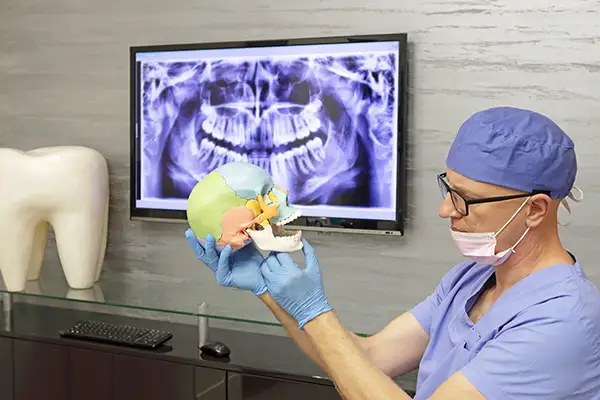Starting the Conversation about Tmj with Your Oral Surgeon
Posted on 8/15/2025 by Surprise Oral & Implant Surgery |
 Have you ever experienced a clicking or popping sound in your jaw? Perhaps you've felt pain when chewing or opening your mouth wide. These could be signs of a common condition called temporomandibular joint disorder, or TMJ for short. Have you ever experienced a clicking or popping sound in your jaw? Perhaps you've felt pain when chewing or opening your mouth wide. These could be signs of a common condition called temporomandibular joint disorder, or TMJ for short.
TMJ affects the temporomandibular joint, which connects your jawbone to your skull. This joint allows you to open and close your mouth, chew, and speak. When this joint is not functioning properly, it can lead to pain, discomfort, and difficulty with everyday activities.
If you're experiencing any of the symptoms mentioned above, it's important to talk to your oral surgeon. Oral surgeons are dental specialists who have extensive training in the diagnosis and treatment of TMJ disorders. They can perform a thorough examination to determine the cause of your symptoms and recommend the best course of treatment.
What to Expect During Your Appointment:
During your appointment, your oral surgeon will ask you about your symptoms, medical history, and lifestyle habits. They will also perform a physical examination of your jaw, face, and neck. This may include feeling for muscle tenderness, checking your jaw movement, and listening for any clicking or popping sounds.
In some cases, your oral surgeon may order imaging tests, such as an X-ray or MRI, to get a better look at the TMJ joint. These tests can help to identify any underlying problems, such as arthritis or joint damage.
Treatment Options for TMJ:
The treatment for TMJ will vary depending on the severity of your symptoms and the underlying cause. Some common treatment options include:
| • |
Conservative treatments: These may include lifestyle changes, such as avoiding hard foods and excessive chewing, applying ice or heat to the affected area, and using over-the-counter pain relievers. |
| • |
Oral appliances: Your oral surgeon may recommend wearing a mouthguard or splint to help stabilize the TMJ joint and reduce pain. |
| • |
Physical therapy: A physical therapist can teach you exercises to strengthen the muscles around the TMJ joint and improve your range of motion. |
| • |
Medications: In some cases, your oral surgeon may prescribe medications to help reduce pain and inflammation. |
| • |
Surgery: In rare cases, surgery may be necessary to correct structural problems with the TMJ joint. |
Restoration Dentistry and TMJ:
In some cases, TMJ can be caused by problems with your bite, such as missing teeth or misaligned teeth. If this is the case, your oral surgeon may recommend restorative dentistry procedures, such as crowns, bridges, or implants, to correct your bite and improve the function of your TMJ joint.
The Importance of Early Diagnosis and Treatment:
It's important to see your oral surgeon as soon as possible if you're experiencing any symptoms of TMJ. Early diagnosis and treatment can help to prevent the condition from worsening and can lead to a better long-term outcome.
Talking to Your Oral Surgeon:
If you're concerned about TMJ, don't hesitate to talk to your oral surgeon. They can answer your questions, discuss your treatment options, and help you develop a plan to manage your condition.
By working together, you and your oral surgeon can develop a treatment plan that will help you regain your oral health and improve your quality of life. |
|
